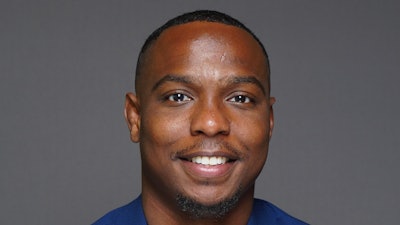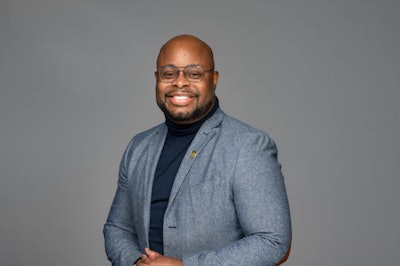Family, it is time for a chat!
Pull up a seat or make whatever adjustments that you need to make so that my brothers and I can rap with you. Over the last few days, we have seen countless opinions internal and external to the HBCU community regarding the exit of Coach Prime [Deion Sanders] from Jackson State University. There have been many opinions flying across Twitter, Facebook, and even national news stations like CNN. Don Lemon in conversation with Bomani Jones said, “I kinda feel like we’re talking about family business in front of everybody”, and he was correct! Dr. Wayne Black
Dr. Wayne Black
When it pertains to HBCUs there often seems to be lots of opinions from people regarding HBCUs that are not needed. Most of those perspectives are deficit framed or accusatory and most of them do not actually call for or leave much room for nuance. The deficit framed thinking whenever HBCUs are mentioned is because of internal and external anti-Blackness as a framework. Many of the individuals who have thrown their useless opinions about would most likely disagree or scowl at such an accusation.
Yet, if we are honest, who would actually own that they are being anti-Black? The issue with anti-Blackness and the desire to be in proximity to whiteness is that most people are not aware that they uphold these value systems. The reality is that as we often say, y’all don’t hate white supremacy enough for me! We say this as a joke but also as a calling-in of a sad reality. Proximal whiteness is not always good and being protective of Blackness and Black spaces does not at all make you a hater, pocket watcher, or a simp. As a people, we have earned the right to be in critique of anything that poses a threat to Black spaces and Black existing.
So, with that being said, how did we get here? Some may believe that being proximal to whiteness is a benefit to HBCUs but in reality, whiteness has never and will never be beneficial to HBCUs. HBCUs are not exempt from racism and as our family would often say, “white doesn’t equal right”. Since 1837, HBCUs have been tormented by the hands of white supremacy. Our schools have long fought for equal access to opportunities and resources while being overlooked, underfunded, and crucified by public perception.  Dr. Frederick V. Engram
Dr. Frederick V. Engram
Specifically, in the context of the Deion Sanders online discourse, several references have been made about the lack of alumni giving and inadequate athletic budget people believe would have retained such a high-profile coach. We hate to be the ones to break the news, but you cannot give your way out of oppression. We (Black people) need to release ourselves from the chokehold of “pulling ourselves up by the bootstraps”. That would be easy to say maybe if we had boots or shoestrings to actually use.
For example, a Forbes report in February of 2022 documented how 18 HBCUs were underfunded by over $12.8 billion from 1987 to 2020. Mind you, there are over 100 HBCUs, and this report only examined 18 institutions over the course of 23 years, which means the actual amount that HBCU have been cheated out of would be well beyond this amount. If that doesn’t do it for you, what about the legal action HBCUs took against their respective states regarding funding disparities between state institutions: Mississippi HBCUs, Alabama HBCUs, Maryland HBCUs, and now FAMU? But wait, we aren't done. In 2021 Harold Love Jr. released a report which shed light on how the state of Tennessee failed to allocate over $544 million to Tennessee State University (TSU) which required TSU to draw from its operating budget to make up for those shortcomings. Therefore, we cannot and will not engage in deficit-framed financial conversations regarding HBCUs without telling the entire story. That’s like preparing spaghetti with no sauce.
The perception that HBCUs do not do enough to retain high profile coaches or that HBCUs are a pipeline to Power 5 athletic jobs is a distorted reality. It’s a perception that lacks a nuance discussion as to why HBCUs are viewed as stepping-stones and not destinations for Black coaches and athletes. Many will say HBCUs don’t have the profile….HBCUs lack the resources…..HBCUs struggle to win….the deficit-framing is resounding. While people continually tell HBCUs what to do to change their financial positions, there’s never a conversation about what systems like the NCAA or federal/state governments should do to help HBCUs out of this financial situation…a situation that white institutions created by divesting from HBCUs.  Travis “Dr. Tee” Smith
Travis “Dr. Tee” Smith
Consider this. The NCAA formed in 1906, but HBCUs could not join the organization and so they made their own leagues. HBCUs were the only place Black athletes could participate in college sports until the 1960s when PWIs realized that they needed Black athletes to have successful white athletic programs. HBCUs were no longer destitute of talent, quite the opposite. Once PWIs began losing to HBCUs and integration happened, That’s when the narrative changed. PWIs no longer avoided and excluded HBCUs, they began to systematically take from them. Resources were shifted so that HBCUs could not keep up with PWIs which followed Black college athletes being pillaged from HBCUs to PWIs. HBCUs were no longer viewed as the destination for Black athletes but became overlooked for white institutions. The perception was that these white schools would provide better outcomes for Black athletes, but time and time again, we see that perception is nothing like reality. Ask Black men and Black women athletes about their experiences at PWIs.
HBCUs continue to be viewed as a stepping-stone or less than for people inside and outside athletics. The perception is HBCUs just need to do better in spite of financial situations. The reality, however, is HBCUs are exploited. Whether it's from the NCAA over penalizing academically and keeping HBCUs out of revenue, or it’s federal or state governments shifting money from HBCUs, HBCUs have been and continue to be exploited for their Blackness and their resources so that people can be in proximity to whiteness.
Deion Sanders won’t be the first nor the last to go from an HBCU to a PWI. Truthfully, that’s not even the problem. This conversation isn’t about Deion or what he did and did not do for HBCUs. If we are being honest, Jackson State was fine before Primetime. Jackson State has ranked within the top 15 in all of FCS since 2003 when the NCAA started publishing the data. Been #1 since 2018.
Don’t get us wrong. We want Deion to be successful, but we won’t overlook how this was indicative of a larger system that views HBCUs as a bridge to walk across for whiter pastures. In the end, our critique has never been about Prime; it’s about the need to be in proximity to whiteness at the expense of Black institutions and that is something we all need to consider when we talk about HBCUs.
Dr. Wayne Black is an Assistant Professor in Sport Administration at the University of Cincinnati.
Dr. Frederick V. Engram Jr. is an Assistant Professor of Social Sciences in the Center for Integrative Studies at Michigan State University.
Travis “Dr. Tee” Smith is an Assistant Professor of Higher Education at Auburn University.





















